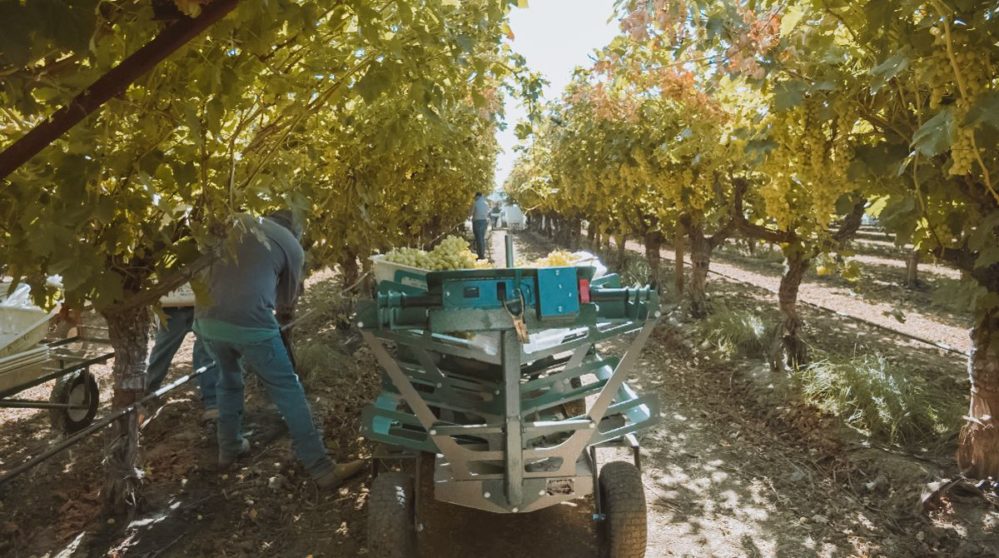Covid-19 has slashed the available seasonal labor for specialty crops in the US, including wine grapes.
Many vineyards in California’s fertile wine country rely on seasonal foreign workers to tackle the harvest, but the relevant H-2A visa program faced uncertainty when the pandemic hit.
Although its toll on agriculture has been devastating, the dearth of H-2A workers has created a new opportunity for robotics startups targeting the specialty crop industry. As the labor supply becomes increasingly unpredictable, every second during the already stressful harvest season is even more valuable.
“Pickers lose an average of seven to 10 minutes per trip down the grape row using such traditional picking methods. This means the average team of pickers loses two hours of picking time per day,” Justin Meng, co-founder and CEO of robotics startup Vinergy, told AFN.
Founded in 2019 and based in Bakersfield, California, Vinergy’s semi-autonomous cart and wheelbarrow are electrically powered and rechargeable. The startup claims these devices significantly improve the most time-consuming, labor-intensive, and riskiest part of the harvest: transporting fruit from the vine to the end of the row.
Vinergy carts are pre-loaded with empty boxes by a (human) cart operator. Pickers fill the boxes as the operator easily and safely moves the cart down each row with the touch of a button. Each cart is powered by a fully programmable, 36-volt electric motor with a continuous run time of eight to 10 hours. Forward and reverse functions with an electric brake allow for easy maneuverability. A low center of gravity gives it a stable footing, even when fully loaded to its maximum capacity of 1,000 pounds.
Each cart rents for $820 per month including maintenance. Vinergy recommends six carts per crew and a dedicated operator for ideal efficiency.
Some worry that robotics and other innovations may displace human workers, but for one farm that has piloted Vinergy’s technology, homo sapiens had a much different opinion.
“When we were picking significant volume we saw tremendous cost savings during our trials with multiple crews and packing variations,” said Rope Eddy, ranch manager at Anthony Vineyards. “Crews that were using traditional wheelbarrows were asking when they could begin using the Vinergy carts.”
Read on to learn more from Meng about how Vinergy is tackling labor challenges for the table grape industry.
AFN: How has Covid-19 affected operations?
Justin Meng: Covid-19 has impacted Vinergy by restricting our suppliers due to shutdowns and shipping times being increased. Due to the shutdowns, lead times are longer. Usually, we can get components in eight to 12 weeks. But now, factories are backlogged and it is now taking up to 16 weeks. I suspect over the fall and winter, factories will get caught up and supplies will fall back into a normal ordering timeframe. I don’t think this will have a lasting effect on Vinergy’s future. Covid-19 is causing a shortage of employees available to work. This shortage will increase the demand for our technology. Growers will then be able to utilize the employees they have with the most efficiency.
Most ag robotics startups operate on a service-based model. Do you plan to stick with this?
Vinergy is both a service-based and product-based business model, and we plan to stick with this because we manufacture the products and then lease them as a service. This model allows us to be profitable much faster.
What are some of the key challenges that you’ve faced since you launched, and how did you overcome them?
The main challenge facing Vinergy is the hesitancy and skepticism of our customers. Harvest methods have not changed in decades. Due to rising labor costs, a diminishing workforce, lower commodity pricing, and a lack of innovation for years, growers are now realizing something needs to change. We are overcoming this by having a collaborative approach with our customers, listening to their needs and working with them to help solve these challenges.
What are the biggest challenges for ag robotics more generally?
I think the concept and ability of an ag robot makes people overthink the issue at hand. We feel simplicity is best when bringing a product to market. You need to walk before you can run.
What has your fundraising experience been like?
The fundraising experience was new for Vinergy and has been a learning experience. Fundraising takes courage and persistence. As co-founder and CEO, I feel a tremendous responsibility to keep my foot on the throttle, providing the vision and pushing Vinergy into its realm of possibilities. Our [biggest investor], Kern Venture Group, and our many angel investors all share the same passion. Most are business owners themselves and are excited about what we are building.
How have your investors added value beyond capital?
Our investors are eager to help in any way possible. Most have contacts within the markets we are targeting and provide connections to new customers. Many of our angel investors have brought others [in to invest.]
Do you have any mentors that have assisted you along the way?
Vinergy has received a tremendous amount of help from the co-founders of Kern Venture Group, John Paul Lake and David Higdon. Over the past year, they have used their vast knowledge, experience, and relationships to assist with grower relations and are actively helping us prepare for our Series A raise in early 2021.
Any advice for other startups out there?
I think what I would say to other startups out there is to believe in yourself. I read this [Goethe] quote daily; it is hung on my wall: “Whatever you can do, or dream you can, begin it. Boldness has genius, power, and magic in it.”





